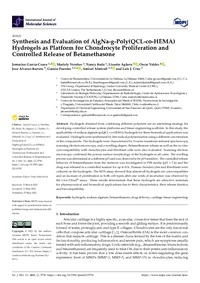Mostrar el registro sencillo de la publicación
Synthesis and evaluation of AlgNa-g-Poly(QCL-co-HEMA) hydrogels as platform for chondrocyte proliferation and controlled release of betamethasone
| dc.contributor.author | García-Couce, Jomarien | |
| dc.contributor.author | Vernhes, Marioly | |
| dc.contributor.author | Bada, Nancy | |
| dc.contributor.author | Agüero, Lissette | |
| dc.contributor.author | Valdés-Lizama, Oscar | |
| dc.contributor.author | Alvarez-Barreto, José | |
| dc.contributor.author | Fuentes, Gastón | |
| dc.contributor.author | Almirall, Amisel | |
| dc.contributor.author | Cruz, Luis J. | |
| dc.date.accessioned | 2022-01-28T17:16:53Z | |
| dc.date.available | 2022-01-28T17:16:53Z | |
| dc.date.issued | 2021 | |
| dc.identifier.uri | http://repositorio.ucm.cl/handle/ucm/3769 | |
| dc.description.abstract | Hydrogels obtained from combining different polymers are an interesting strategy for developing controlled release system platforms and tissue engineering scaffolds. In this study, the applicability of sodium alginate-g-(QCL-co-HEMA) hydrogels for these biomedical applications was evaluated. Hydrogels were synthesized by free-radical polymerization using a different concentration of the components. The hydrogels were characterized by Fourier transform-infrared spectroscopy, scanning electron microscopy, and a swelling degree. Betamethasone release as well as the in vitro cytocompatibility with chondrocytes and fibroblast cells were also evaluated. Scanning electron microscopy confirmed the porous surface morphology of the hydrogels in all cases. The swelling percent was determined at a different pH and was observed to be pH-sensitive. The controlled release behavior of betamethasone from the matrices was investigated in PBS media (pH = 7.4) and the drug was released in a controlled manner for up to 8 h. Human chondrocytes and fibroblasts were cultured on the hydrogels. The MTS assay showed that almost all hydrogels are cytocompatibles and an increase of proliferation in both cell types after one week of incubation was observed by the Live/Dead® assay. These results demonstrate that these hydrogels are attractive materials for pharmaceutical and biomedical applications due to their characteristics, their release kinetics, and biocompatibility. | es_CL |
| dc.language.iso | en | es_CL |
| dc.rights | Atribución-NoComercial-SinDerivadas 3.0 Chile | * |
| dc.rights.uri | http://creativecommons.org/licenses/by-nc-nd/3.0/cl/ | * |
| dc.source | International Journal of Molecular Sciences, 22(11), 5730 | es_CL |
| dc.subject | Hydrogels | es_CL |
| dc.subject | Sodium alginate | es_CL |
| dc.subject | Betamethasone | es_CL |
| dc.subject | Drug delivery | es_CL |
| dc.subject | Cartilage tissue engineering | es_CL |
| dc.title | Synthesis and evaluation of AlgNa-g-Poly(QCL-co-HEMA) hydrogels as platform for chondrocyte proliferation and controlled release of betamethasone | es_CL |
| dc.type | Article | es_CL |
| dc.ucm.indexacion | Scopus | es_CL |
| dc.ucm.indexacion | Isi | es_CL |
| dc.ucm.uri | www.mdpi.com/1422-0067/22/11/5730 | es_CL |
| dc.ucm.doi | doi.org/10.3390/ijms22115730 | es_CL |



